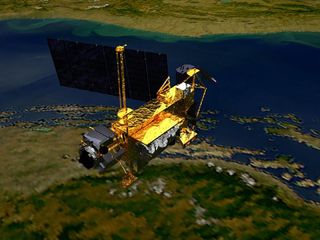What Are the Odds You'll Get Struck by a Falling Satellite?

On Friday a dead NASA satellite the size of a school bus is expected to enter the atmosphere, break into pieces and rain down upon Earth. Though space agency officials don't yet know where the chunks (some weighing as much as 300 pounds) will hit and haven't narrowed down exactly when, they say the chances of the falling space debris striking a person are extremely small.
How small? And how do they know? Furthermore, there are half a million bits of random space junk in orbit around Earth. So, what's the chance that you, reader, will be struck by some piece of former space flotsam in your lifetime?
According to Mark Matney, a scientist in the Orbital Debris Program Office at NASA's Johnson Space Center in Houston, the odds that any of the 7 billion people on Earth will be struck by a piece of the soon-to-fall satellite is 1 in 3,200. "The odds that you will be hit … are 1 in several trillion," Matney said. "So, quite low for any particular person."
To make this calculation, Matney explained, analysts work out how much debris will actually make landfall. (Most falling junk just burns up in the atmosphere.) They then make a grid of how the human population is distributed around the globe. Oceans, deserts and the North and South poles are largely devoid of people, for example, whereas coastlines are brimming with them. In short, they must figure out which patches of Earth have people standing on them.
Throwing in a few more minor details, such as the latitudes over which satellites spend most of their time orbiting, the scientists calculate how likely it is that a piece of space debris will strike the ground where a person happens to be. This time around, the odds are 1-in-3,200, and there's a one-in-several-trillion chance that not only will a person get hit, but that person will be you.
Sounds scary? It shouldn't: You're a few million times more likely to get struck by lightning in the next year. [Lightning Strike Survivor Video: Real or Fake? ]
So let's assume you dodge this particular satellite. What are the chances you'll get struck by something falling from orbit ? space debris or otherwise ? during your lifetime?
Sign up for the Live Science daily newsletter now
Get the world’s most fascinating discoveries delivered straight to your inbox.
NASA says it's impossible to nail down the overall risk to an individual posed by all the spacecraft, satellites and space junk currently orbiting us, even though it believes the risk is extremely small.
"It would be difficult and time-consuming to generate the numbers correctly for any particular spacecraft," Nick Johnson, chief scientist for orbital debris, wrote in an email. "To do that for all of the thousands of spacecraft and rockets in orbit — past or present — would not be tractable. Such a calculation cannot be made, in part because we do not know the construction details of foreign spacecraft and launch vehicles."
The European Space Agency, on the other hand, feels more comfortable pinning down the odds: "The annual risk of a single person to be severely injured by a re-entering piece of space debris is about 1 in 100,000,000,000" ? one in 100 billion, said Heiner Klinkrad, head of the ESA's Orbital Debris Office. In the course of a 75-year lifetime, then, the odds of getting injured by space junk would be a little less than one in 1 billion. [Will We Be Able to Deflect an Earthbound Asteroid? ]
By comparison, Klinkrad said, "the annual risk that a single person gets struck by a lightning is about a factor 60,000 higher, and the risk of a serious injury from a motor vehicle accident is about 27 million times higher than the risk associated with re-entry events."
In 1997, the tiny threat of space debris became a reality for Lottie Williams. The Tulsa, Okla., resident became the only person known to have been hit by a piece of space debris. A DVD-size piece of metal from a Delta II rocket struck her shoulder while she was exercising at a park. Luckily, because of wind resistance, it was fluttering to the ground so slowly that she wasn't hurt.
Klinkrad noted that most people accept lightning strikes and car accidents as necessary risks of day-to-day living. In this modern world where we rely so heavily on satellites for communication and navigation, perhaps we must also accept the exceptionally small risk posed by space debris.
- When Space Attacks: The 6 Craziest Meteor Impacts
- Spherical Flames and Invisible Burps: 6 Every Day Things that Happen Strangely in Space
- Video: Crashing Satellite's Debris Region Predicted
Follow Natalie Wolchover on Twitter @nattyover. Follow Life's Little Mysteries on Twitter @llmysteries, then join us on Facebook.
Natalie Wolchover was a staff writer for Live Science from 2010 to 2012 and is currently a senior physics writer and editor for Quanta Magazine. She holds a bachelor's degree in physics from Tufts University and has studied physics at the University of California, Berkeley. Along with the staff of Quanta, Wolchover won the 2022 Pulitzer Prize for explanatory writing for her work on the building of the James Webb Space Telescope. Her work has also appeared in the The Best American Science and Nature Writing and The Best Writing on Mathematics, Nature, The New Yorker and Popular Science. She was the 2016 winner of the Evert Clark/Seth Payne Award, an annual prize for young science journalists, as well as the winner of the 2017 Science Communication Award for the American Institute of Physics.
